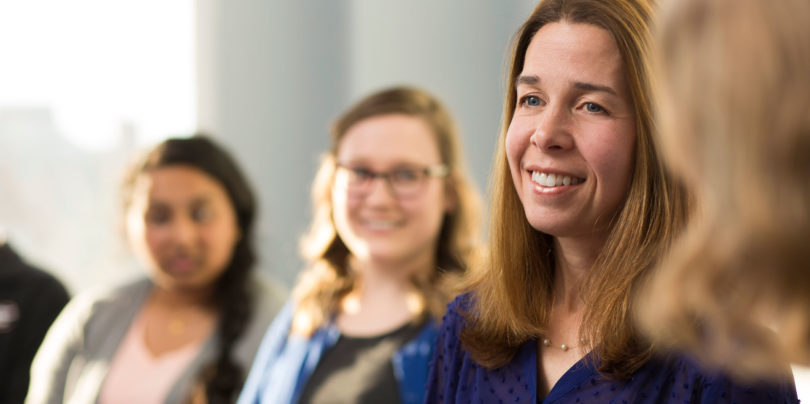Paula Lemons, an associate professor of biochemistry and molecular biology, conducts research that aims to improve science education across the nation while helping students at UGA develop independence, teamwork and problem solving skills.
Where did you earn degrees and what are your current responsibilities at UGA?
I earned a B.S. in biology at Southern Wesleyan University in 1994. In 1999, I earned a Ph.D. in biochemistry at University of Kentucky. My postdoctoral work took place at Duke University from 1999-2001, and it was at Duke where I started my teaching career and began biology education research.
At UGA, I serve as associate professor of biochemistry and molecular biology in the Franklin College of Arts and Sciences. I do biology education research and teach “Introductory Biochemistry.” I also serve as director of UGA’s Scientists Engaged in Education Research Center. The SEER Center aims to promote education research in science, technology, engineering and math (STEM). Through SEER, faculty, postdocs, and students from across UGA collaborate to increase the impact and recognition of our research here and beyond.
When did you come to UGA and what brought you here?
In 2007, during a transition in my career, I met Peggy Brickman, Josiah Meigs Distinguished Teaching Professor of Plant Biology, at a conference. She told me that UGA might be hiring a new biology education researcher. I said, “Great! Let me know what happens!” I thought I would never hear from Peggy again, but she wrote me a few months later to let me know about the search. I applied and got an interview. At the interview, I liked what I learned about UGA, and I had a charming visit with professor Dan DerVartanian, who continues to be a good friend. In particular, I was drawn to the opportunity to pursue biology education research on the tenure track alongside a fantastic group of colleagues and a well-regarded College of Education. I started my position in 2009. The move to UGA was a great decision; the opportunities continue to amaze me.
What are your favorite courses and why?
I teach two courses, and they are both my favorites. When I teach “Introductory Biochemistry,” I use case studies, and peer learning assistants help me facilitate student learning. I genuinely enjoy the content and skills we focus on in the class, and seeing students learn energizes me. Moreover, the students and I connect well, because they like science and show maturity and savvy in their approach to learning. I also teach “Laboratory Research in Biochemistry and Molecular Biology.” In this course, I mentor undergraduate research assistants. Working with students as researchers, I see the diverse experiences and skill set each one brings to the lab. I am able to nurture their learning about the nature of science, primary literature, and how research is done. I get to help them develop independence, teamwork and problem solving, which are skills they can use in any profession.
What interests you about your field?
My field interests me because of the opportunity to generate new knowledge that can help solve societal problems. Many important problems are facing U.S. higher education. For example, the college-educated STEM workforce may be insufficient to meet the projected demands of the U.S. economy for jobs in areas like health care and research and development. And the diversity of the STEM workforce does not represent national diversity, resulting in a lost opportunity for innovative problem solving. Educational research can be used to address these problems. I conduct discipline-based education research. That is, I mix my deep knowledge of science, i.e., biology content and the scientific enterprise, with expertise in social science research to address important research questions. For example, why is it difficult for students to learn “non-covalent interactions”? Or, what motivates college faculty to persist in changing their teaching? Through collaboration with other discipline-based education researchers, cognitive psychologists and organizational psychologists, I can contribute to the production of new knowledge that will benefit our educational system.
What are some highlights of your career at UGA?
There have been so many, but here are a few, in no particular order:
- Working alongside my colleagues to establish the SEER Center.
- Participating as a guest at student functions like sorority dinners for faculty.
- Working with a fantastic group of colleagues in UGA’s Biology Education Research Group and assisting them in advancing their careers.
- Seeing good things happen to my students—being named UGA Amazing Students, getting into grad school, getting into med school.
- Attending the USG Board of Regents Gala at the College Football Hall of Fame to receive the Regents’ Excellence in Teaching Award.
- Receiving tenure and promotion to associate professor.
- Hosting the Bio-Religion Bash, a party that my husband (Derrick Lemons, assistant professor in the department of religion) and I put on each semester for our students.
How does your research or scholarship inspire your teaching, and vice versa?
My research directly influences my teaching. As I learn how undergraduates think about biology and how they solve problems, I can immediately use that knowledge to design curricula for my classes and tailor my interactions with students to improve their learning. Likewise, new research questions and insights into data analysis often emerge while I’m teaching or collaborating with other faculty about teaching.
What do you hope students gain from their classroom experience with you?
I hope students expand their knowledge base and improve their problem-solving skills. I also want to inspire them to keep learning. Many students come into biochemistry nervous and uncertain. I want them to leave with the confidence and desire to continue to learn biochemistry. Many students come to research with limited knowledge of how research is done and how they could ever contribute. I want them to leave empowered to continue applying their background and expertise to attack important problems.
Describe your ideal student.
I used to think in terms of ideal students, but the more I’ve worked with students, the more I’ve learned that every student brings unique talents and skills to the table. The fun part for me is to give students opportunities to show their talents and skills and then to work with those talents to build a classroom or research community where individuals can shine and can see the importance of their contribution to a project. I love to work with any student who is willing to show up, engage, work hard, contribute to the team, and grow.
Favorite place to be/thing to do on campus is…
I enjoy hanging out in the Science Learning Center. The coffee and bagels are yummy, and the space is great for meeting with students. Some of my favorite times of my career were last semester with my fall 2016 “Introductory Biochemistry” students in the Science Learning Center. Outside the SCALE-UP classroom on the third floor, we held office hours where many of us would gather and discuss biochemistry around the whiteboard. We ended the semester with a class party in the same spot!
Beyond the UGA campus, I like to…
I like to hang out with my family—my husband Derrick and sons Nathaniel and Zachary. We enjoy participating in the kids’ sports events. We also like to play basketball in the driveway, where my kids routinely beat me in one-on-one. In fact, whether I’m playing with my family, friends or alone, I love sports, and my favorite sport is running. Our family also prioritizes travel. Our most recent trip was to Australia and New Zealand.
I also enjoy leading a book discussion group that focuses on the intersection of science and faith. Most weeks we gather at Two Story Coffee to discuss the works of authors like Frances Collins, Alister McGrath, John Walton, and contributors to BioLogos (biologos.org).
Community/civic involvement includes….
I am involved in my church, Temple United Methodist, where I teach the youth Sunday school class, teach Science Zone every summer for Vacation Bible School, and sometimes speak at church gatherings. One of the ministries our church contributes to is Our Daily Bread Community Kitchen.
I also plug in when needed in the Oconee County school system, where my kids attend, and by coaching and assisting with little league baseball or rec league basketball.
Favorite book/movie (and why)?
My favorite book is the Bible, because it tells the story of God’s unfolding revelation throughout history and through Jesus Christ. Because I follow Jesus, the Bible provides the organizing framework for my life.
I love science fiction movies, and some of my favorites past and present include “Alien” (1979), “Outbreak” (1995), “Avatar” (2009), “The Martian” (2015) and “10 Cloverfield Lane” (2016).
In the fantasy genre, I’m a fan of C.S. Lewis’ “Chronicles of Narnia” and J.R.R. Tolkien’s “The Lord of the Rings.”I preferred the books to the movies. I also enjoy learning about the Inklings, a literary discussion group that included Lewis and Tolkien, and have visited their meeting spot The Eagle and Child in Oxford, England. Alister McGrath discusses the Inklings and the relationship between Lewis and Tolkien in his biography “C.S. Lewis – A Life: Eccentric Genius, Reluctant Prophet.”
Proudest moment at UGA?
My proudest moments at UGA have been when something significant happened to my students, when my students express their appreciation for me, and when an idea I’ve worked hard to develop comes to fruition. Several of my students have been named Amazing Students and received important recognitions and awards like the Goldwater Scholarship or Center for Undergraduate Research Opportunities (CURO) research awards. Students have given me certificates of appreciation and anonymously thanked me through the Center for Teaching and Learning Thank-a-Teacher program. Recently I led a team of colleagues to submit a major grant focused on institutional change in STEM education. I hope we get the grant, but even if we don’t this first try, I find joy in the process of pulling together a team of super-smart and engaged people to accomplish something none of us could do alone.
Is there anything else you’d like to add?
It’s great to be a Georgia Bulldog!








